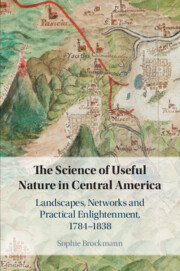 The Science of Useful Nature in Central America
The Science of Useful Nature in Central America Published online by Cambridge University Press: 27 August 2020
Chapter 3 explores the promises and contradictions inherent in the information drawn from these local and global knowledge networks. There were tensions that were never quite resolved between the production of locally relevant knowledge that rejected theoretical approaches and a global intellectual movement that praised universal knowledge. The Economic Society responded to this by carefully negotiating the sources of knowledge which it received from its networks, especially on the topics of natural history and medical botany, and building up its own epistemologies and definitions of practical Enlightenment that made the local applicability of any information the ultimate test of its value. Frameworks of knowledge with universal aspirations, such as Linnaean taxonomy, were not welcome when local descriptions would be more translateable within Central America. I argue that these stubbornly local conceptualisations of knowledge became problematic when a comparison with other places was required, for instance in the context of attempting to export plants from Guatemala to other places, and in debating the merits of plantain trees with scholars in other parts of the empire.
To save this book to your Kindle, first ensure no-reply@cambridge.org is added to your Approved Personal Document E-mail List under your Personal Document Settings on the Manage Your Content and Devices page of your Amazon account. Then enter the ‘name’ part of your Kindle email address below. Find out more about saving to your Kindle.
Note you can select to save to either the @free.kindle.com or @kindle.com variations. ‘@free.kindle.com’ emails are free but can only be saved to your device when it is connected to wi-fi. ‘@kindle.com’ emails can be delivered even when you are not connected to wi-fi, but note that service fees apply.
Find out more about the Kindle Personal Document Service.
To save content items to your account, please confirm that you agree to abide by our usage policies. If this is the first time you use this feature, you will be asked to authorise Cambridge Core to connect with your account. Find out more about saving content to Dropbox.
To save content items to your account, please confirm that you agree to abide by our usage policies. If this is the first time you use this feature, you will be asked to authorise Cambridge Core to connect with your account. Find out more about saving content to Google Drive.